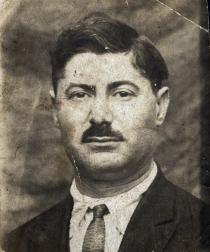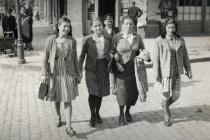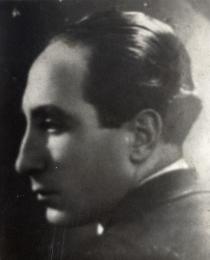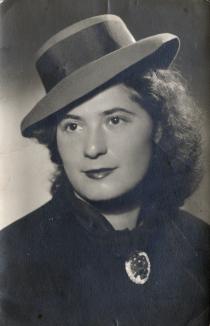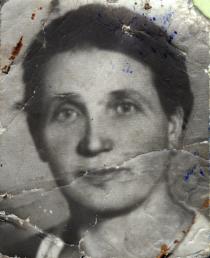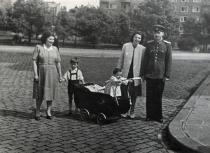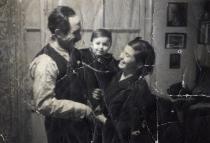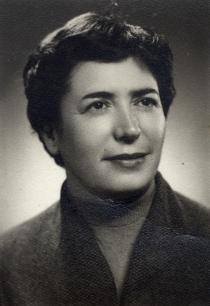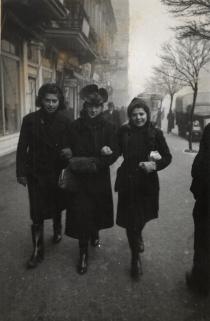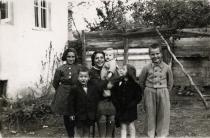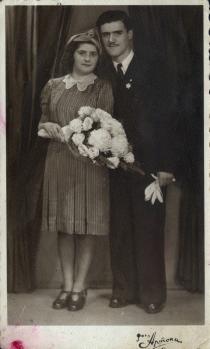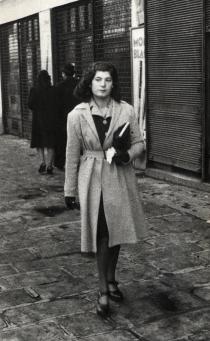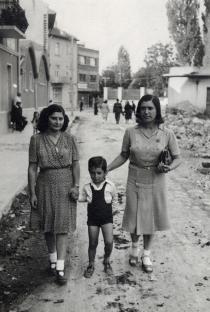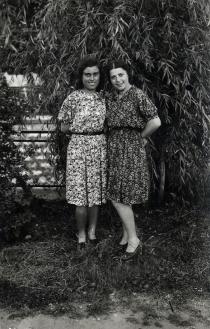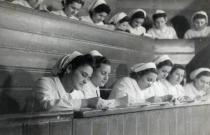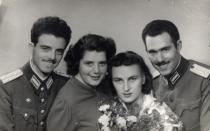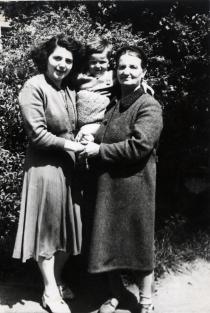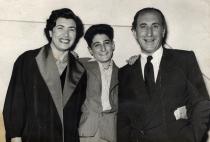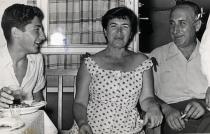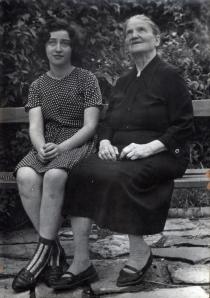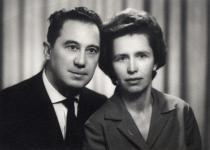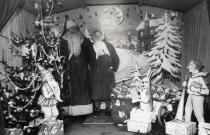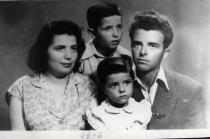
Sonya Adolf Lazarova
Sofia
Bulgaria
Interviewer: Svetlana Avdala
Date of interview: November 2005
‘When I get up in the morning the first thing I do is put on lipstick.’ And the lipstick suited her. During our work of several days she always met me with a large smile and a table arranged, because Sonya is a person who likes to give and help people. It’s not accidental that she fulfilled her dream to become a nurse.
And one day she said to her mother, ‘How happy I am that you gave birth to me!’ Sonya really has a jolly character. For her there are no bad people or situations. She speaks about the events in her life without pompous heroism or stoicism. They just happened like that.
At the age of 82 Sonya starts her day with applying lipstick and yet she still shivers when speaking about her first big and unfulfilled love. Years simply passed by without touching her.
Growing up
My family
Going to school
During the War
After the War
Glossary
My name is Sonya Adolf Nusan. I was born on 12th August 1923 in Ruse [Northeastern Bulgaria, 251km from Sofia]. My ancestors were German and Russian Jews but I have no memories about them, as I’m the youngest of the six children in our family. My eldest sister’s name was Gizela, born in 1910, and then came Liza, born in 1912, Hilda, born in 1915, my brother Fridrich, born in 1917, and my sister Zivi, born in 1921. Only Zivi and Fridrich are alive today. She lives in Israel, while he lives in Bulgaria. They were all born in Ruse.
From my earliest childhood I remember the pretty house that we had in the center of Ruse, behind the theater on Konstantin Velichkov Street. It was owned by my maternal family: my mother, Berta Hirsh Nusan [nee Goldenberg] who was born in 1888, her sisters Liza and Erma as well as my maternal grandparents. We sold it about two or three years ago. It was surrounded by an orchard. I remember my mother and father but I have no memories of my grandparents. When I was born they weren’t alive and I have no information about their names. Later my sisters used to tell me that they had had servants at home, as well as a remarkable order, which indicates that they were well off.
My father, Adolf [Avram] Lazarovich Nusan, was born in Ploesti in 1887. I have no information about his exact date of birth. At the age of 20 he came to Bulgaria, to Ruse. He spoke Romanian, Bulgarian and Yiddish. I know that he wasn’t rich, it was even rumored that he came here ‘barefoot,’ when he, sort of quickly, married my mother. I don’t recall anyone telling me why he came to Bulgaria – but most probably to search for a more profitable market for his craft – millinery, as well as better treatment of his Jewish origin, because his real name was Avram, yet he changed it to Adolf in Romania for the sake of convenience. I don’t know how and why he married my mother, but I know that she was a true beauty, she came from a well-off family, and moreover she was a very kind-hearted woman and always ready to help people. So I believe these were the reasons for their marriage.
Though my father was ‘barefoot,’ he had a successful business: the millinery. In Ruse he established a hatter’s workshop with seven employees. In this workshop they initiated the production of hats with a stiff body, both cylinders and straw hats, which was a rare practice for Bulgaria in those days. In the period of the wars [the First Balkan War 1, the Second Balkan War 2 and World War I 3] the workers enrolled in the army and the workshop closed down. Maybe this was the reason why my family moved to Sofia in order to try to make a living.
My mother was born in Ruse. Her mother tongue was Yiddish and Bulgarian, but she spoke several other languages: French, German, Russian, and English. She had graduated from a German college in Ruse, which was a high level of education for a woman at that time. At home we spoke Bulgarian and Yiddish.
I was three years old when my family decided to leave Ruse and move to Sofia. We settled on the fifth, i.e. last, floor of a building on Maria Luiza Street, as it was the cheapest one. We used to rent it until our internment in 1943 4.
There was a yard in which we, the children used to play draughts, ‘people’s ball’ [ball game in which two teams try to get the other side’s players out by hitting them with a ball], rope. The neighbors in the block of apartments were mostly Bulgarians, but other Jewish families also lived in the blocks, which surrounded the common backyard.
Our family inhabited a kitchen and two rooms. My parents used to sleep in one of the rooms, while we, the girls, slept in the other one. My brother used to sleep in the kitchen. The furniture was very modest. There were beds, tables and a dresser. Instead of a wardrobe we used to hang our clothes on a hat and coat rack, which we covered with a piece of cloth. We used a firewood-burning stove. There was a toilet in the hallway and running water in the kitchen, yet there was no bath. My sisters used to go to the public city bath, and when I was a little girl I used to be washed in a trough with heated water.
We used to sleep two in one bed, head to toe. And when my mother woke us in the morning she always confused our names because she could never recognize us in this position. Actually all of us always woke up at the same time.
At that time Sofia used to be calm, clean and green. It wasn’t crowded with enormous blocks of apartments and there was no terrible deafening noise. Jews were dispersed all over the city, but mostly in Iuchbunar 5, where the poorer ones used to live.
I remember the synagogue on Ekzarh Yosif and Bacho Kiro Streets: the old one. [The interviewee means the Midrash. According to the statistics by 1912 there were 5 synagogues in Sofia, one of which was attended by the Ashkenazi Jews. By 1928 the number of Ashkenazi Jews in Sofia was 1,600, with a synagogue and a rabbi. There was also a cheder with 15-20 children and a teacher.] There was a rabbi but I can’t recall his name and he was wonderful. I remember the service. It was in Bulgarian. I remember the cautionary speeches [prayers], choir, etc.
My mother was an educated woman. Although she had graduated from a German college in Ruse and despite the fact that she spoke several languages, after her marriage she was devoted to bringing up her children, born every second year. She was a very noble person. She lived for the sake of helping people. There weren’t bad people according to her. She was ready to help anyone yet she never took part in charity organizations. Her genuine goodness was expressed in many cases, which I would love to share with you. She never yelled at us, nor did she punish us. Calmness was the most important thing to her. She always taught us to forgive people and to never get angry. She was tall, with a white face and blue eyes; the only blue eyes in our family. She always put her hair up in a bun. She didn’t use make up and always dressed in a plain manner.
My father was also a very handsome man: tall, slender, dark hair and eyes, and a mustache like that of a movie star. He always dressed elegantly and wore a soft hat. In Sofia he opened a millinery workshop with an associate of his. It was on Lege Street. Later this associate cheated him, my father went bankrupt and got divorced for reasons that I don’t know. [Editor’s note: Until 1944 marriage of Jews in Bulgaria was performed and legalized by the consistory with a marriage contract (ketubbah). In Bulgaria at that time there was no institution of civil marriage (Christians respectively got married in the church). Regarding divorces the quoted books usually are: ‘Shulhan Arouh’ and ‘Even Aezer’ by Joseph Caro, where the following sections are examined in detail: engagement, vow, marriage, ceasing of marriage, divorce, chaliza (release of marriage due to childlessness). ‘Jewish marriage and divorce law,’ a handbook by Rabbi Daniel Zion and Albert Varsano comments on all cases of Jewish practice in ceasing marriage and divorce and generalizes the rabbi experience until 1940.] Then he decided to leave for Israel in 1939. He remained there and stopped supporting our family. He passed away there but I have no information about the year, most probably between 1955 and 1965.
My father wasn’t interested and had no respect for money. He wasn’t capable of saving; he had a Bohemian nature. He was always ready to give his last penny to someone who would ask him. He traveled a lot on business and when he returned home there were always presents for us: something nice and delicious, very often kebapcheta [grilled oblong rissoles] or ‘marzipanes’ [a confectionery consisting primarily of ground almonds and sugar]. He didn’t earn much and never did he bring home the full amount, but my mother never blamed him for it. Actually they resembled each other a lot in this matter because she in her turn willingly invited anyone even if she would deprive us of something. My parents were tender and kind people. They never punished us, nor did they scream at us. My elder sisters were engaged in my upbringing. I would like to talk about them.
Gizela Asher-Anski [nee Nusan] was the eldest among us and a leader in every sense. She was talented, ambitious and intelligent. She made a brilliant artistic career with appearances in Israel and the USA, where she passed away.
She graduated from a Bulgarian elementary, junior high and high school. After graduation she initially worked in the famous dress atelier of Otto Seiner on Lege Street. There she sewed, cut, and worked as a model and sometimes, because imagination was among her greatest gifts, she designed her own clothes. As early as her work in Otto Seiner’s fashion atelier she used to play in the Jewish amateur theater [In 1928 a theater troupe was formed at Byalik chitalishte 6. It was led by Mois Beniesh and Leo Konforti: a theater and film actor, who was born in 1911 in Dupnitsa, and died in 1970. His work is mostly associated with the ‘Ivan Vazov’ National Theater.] together with Leo Konforti, Bitush Davidov [a librettist], Milka Mandil [an actress, she’s still alive and lives in Israel], Nichko Benbasat [a public figure, journalist, who worked at the Bulgarian National Radio for many years]. There she met her future husband, Eliezer Asher Anski [a writer and playwright, who was active in the 1920s-1930s], who was a director.
Leo Konforti, with whom they were close friends, most probably introduced her to some leading actors of the time. She attracted their attention and later she appeared on the stage of the National Theater with Ruzha Delcheva [(1915-2002), a famous Bulgarian drama and film actress, graduated from Nikolay Osipovich Massalitinov’s theater school in 1935, specialized for three years in ‘Deutsches Theater’ in Germany, actress of ‘Ivan Vazov’ National Theater since 1938], Magda Kolchakova [b. 1914, a Bulgarian drama and film actress, played in the ‘Ivan Vazov’ National Theater from 1940] and Ivanka Dimitrova [b. 1920, a Bulgarian drama and film actress, played in ‘Ivan Vazov’ National Theater.] It’s difficult for me to name the theater plays she performed, although I have seen them all. Nor can I remember the years when I watched them.
She knew many people from Sofia’s artistic Bohemian circles. The people mentioned above often visited us. She was always the center of attention in these merry companies: she sang, told funny stories, recited poems by [Hristo] Smirnenski 7, [Hristo] Botev 8, [Nikola] Vaptsarov 9, and others. She got married around 1939 to Eliezer Asher Anski. He was a Sephardi Jew. His family was well-off. They owned an apartment on the corner of Tsar Boris and Tsar Simeon Street [in the center of Sofia]. He was always quiet, reticent, and uncommunicative; maybe sort of a calm background to the ‘bright’ Gizela, who always shone. Probably it was due to his character that he couldn’t achieve a good career as a director. Later, when in 1948 their whole family moved to Israel, he changed his profession and started making art mosaics.
Gizela and her husband were two complete opposites. Eliezer adored Gizela and immensely loved their son Alex, who was born in 1940. In Sofia they lived at first in a lodging on Sofronii Street and after that they moved to Eliezer’s own apartment. When they left for Israel, their son Alex also started appearing on the theater stage as early as a little boy. He also made a good artistic career and now is a famous actor in the Abima [Hebrew: ‘the stage’] National Israeli Theater of Tel Aviv. His artistic talent, a continuation of his parents’ gift, was also revealed when he starred in a radio show addressed to mothers of Israeli soldiers which was meant to keep their spirits high. [Apart from being an actor, Alex Anski leads a radio show on the Israeli Military Radio. He also speaks Bulgarian].
Lili [Liza] also worked as a seamstress in the fashion atelier of Otto Seiner. She finished Bulgarian elementary, junior high and high school as well. She was also artistically gifted and was attracted by Gizela to the Jewish amateur theater, but she didn’t have Gizela’s genuine talent. She loved reading a lot. She had inherited the affinity to learning foreign languages from my mother. She attended language courses, spoke several languages and later became a bookseller. She was well-measured and frugal in company. She was always elegantly dressed, attentive to the smallest detail of her dress, because she was very exacting both to herself and to the other people. She got married in 1956 to the dentist Isak Assa, with whom she lived but had no children. She divorced him in 1958 and left for Israel by herself. There she worked as a seamstress, and got married again, to a Russian Jew with the family name Nisan, who had a daughter. She raised the child as her own. She died in Israel around 2000.
Hilda finished only a Bulgarian elementary and junior high school. She had a beautiful voice and participated in an amateur Jewish choir at the Jewish chitalishte. [Editor’s note: After World War I, in 1919 the ‘Obsht Podem’ [Common Uplift] Jewish chitalishte was founded. It existed until 1924. In 1924 the Jewish chitalishte ‘H.N.Byalik’ was formed, which by 1928 was already fourth in range among the Sofia community centers, ‘Aleko Konstantinov’, ‘Gotse Delchev’ and ‘Hristo Botev.’ The community center had 1900 volumes of literature, a theater troupe, a literature circle and a Jewish choir. There was also another Jewish chitalishte that was situated in Iuchbunar quarter, between Klementina and Opalchenska Streets.] In her selflessness and devotion to people Hilda resembled mostly my mother. She worked in a hosiery factory. She married Mihayl Mihaylov, who was a Bulgarian and an electrician by profession. They had two daughters, Lilyana and Borisalva. She never moved to Israel and died in Sofia, but I can’t recall the year of her death.
Fridrich was diligent, strict and reserved. He had the gift of an artist. Very often, when Gizela and Lili brought patterns home, which they had to draw and design in accordance with their clients’ bodies’ dimensions, he used to help them. It was as early as then that he started revealing his designer capabilities. He graduated from the ‘Hristo Botev’ construction vocational school. [Editor’s note: Technical schools are dedicated to specialized technical education. There are 3- and 4-year ones. Apart from the common subjects, the educational system includes specialized technical subjects oriented to the respective industrial branch – construction, mechanics, chemistry, electronics, etc. A great part of the students of technical schools continue with a higher technical education.] It was because of these skills that he became a designer and later, a constructor, in a science institute.
He has married twice. His first wife, Valka, was Bulgarian. He has a daughter, Nina, with her. He lived with Valka for ten years before they got divorced. Later he married a colleague of mine, Vanya, a midwife. I introduced them to one another. They liked each other and went to a sweet shop. They got married in 1965. Vanya also has a daughter from her first marriage. The two stepdaughters lived together with Vanya and Fridrich. Vanya actually raised Fridrich’s daughter from his first marriage, who had never lived with her mother. Vanya was a very noble person, yet Fridrich also divorced her due to property arguments.
Zivi was shy, meek, caring and a great housewife. She graduated from the Romanian school [Editor’s note: According to the practice every official religion in the country registered in Sofia after Bulgaria’s Liberation from the Turkish rule in 1878 had the right to support its own school, for example: Armenian church with an Armenian school, Greek church with a Greek school, Catholic church with a Catholic school, etc.]. It was situated behind the Central Synagogue. She was deeply in love with Isak. They went to live with his family a year before they got married.
Isak was a very handsome and ambitious man. His family was poor and as a student he had to both study and work in order to provide for his family. Until the third grade he used to work as a shop assistant and a barber’s assistant. But as ambitious as he was, he finished evening classes and later the Institute of Ecomomics with honor. Finally he became the director of the ‘Stalin’ technical school. Zivi worked for many years as a typist in OJB ‘Shalom’ 10. They have two children: a son, Sabitay and a daughter, Ruth. Isak died in 1981. In 1992 Zivi left for Israel and currently she lives with her daughter.
Apart from my parents, my sisters and brother were also involved in bringing me up. Actually they were the tough ones. They inspected whether my shoes were polished, whether all the buttons were well sewed, whether everything was neatly and tidily put in order. I wasn’t supposed to be late in the evening and had to strictly do everything I was told.
Once a friend of mine took me to a hairdresser. I was 12-13 years old then. When I came home Lili saw me and told me to immediately wash my hair, although I hadn’t even paid for my hairstyle. How strict she was! If I had done everything like I was ordered and supposed to, I was awarded with a small cone of ice-cream; it cost stotinkas [pennies, 1 stotinka = 0.01 lev]. It was my award and it was possible for me to receive it only at the end of the week: on Saturday or Sunday. I often told them that I was going to marry an ice-cream man, because I just love ice-cream, even now.
Fridrich was responsible for the preparation of my lessons. He examined me and checked whether I had learned my lessons. Gizela and Lili worked and all the rest went to school. Thus they supported the family budget. My two sisters dressed very elegantly; after all they worked in a fashion atelier and I wore their clothes. How impatiently I used to wait for Hilda to come home, so that I could wear her coat and go out. I wore all of her clothes with the exception of underwear and shoes, because I had large feet. When I was growing up they used to buy me larger shoes, which often ‘banged.’ Therefore they always made me wear wool socks, in order to fill up the shoes. And Gizela and Lili used to wear silk ones. When the soles tore, we used to cut them and fill them with cardboard and that is how I wore them.
We weren’t poor and we always had something on our table, yet we lived economically. Once a week, Zivi, Hilda and I used to go to the women’s market [one of the first Sofia markets. It was called this way, because its sellers were mostly women from neighboring villages. Other popular markets are: Rimskata Stena [The Roman Wall Market] in Lozenets quarter, as well as ‘Dimitar Petkov’ Market and Pavlovo Market.]. We usually went there late in the afternoon when the sellers lowered the prices. We used to buy meat and sausages from the Dokuzanov butcher’s. We used to buy from the so-called ‘pieces:’ the smaller parts of the big parts, which were cheaper. I would like to mention here that we, the children, didn’t observe the kashrut. Such kind of food was never cooked at home, therefore we felt free to buy meat from Dokuzanov.
At that time in Sofia street-vendors used to sell salep and boza 11. We used to drink salep 12. It was a colorless sweet drink with a very pleasant scent and the thickness of boza, but it was cheaper than boza and we often used to dilute it with water. It was very tasty indeed.
Thanks to the contacts of my two sisters Gizela and Lili, who communicated with the artistic circles, we used to read a lot of fiction books at home. I remember ‘Gone with the Wind’ [by Margaret Mitchell (1900-1949)], and ‘From Heraclitus to Darwin’. I was most interested in the medical books. While the others were playing with dolls I used play ‘doctors and patients.’ I dreamed of healing people.
My parents’ friends were both Jews and Bulgarians. They kept relations with the Jewish community also. A Bulgarian friend of mine, whose name was Victoria, often visited us. She had become part of our family. We used to share everything with each other: we went to the cinema, we studied together, but as soon as we offered her something to eat she always declined the invitation. Only after 9th September [1944] 13 she admitted to us that she had been told that Jews prepared their food with human blood. She felt really sorry about that and about all these missed opportunities to taste our delicious food. My mother used to cook quite well but I can’t say she was a great cook. I don’t remember any of her recipes. The whole family used to gather around the table every evening. At lunchtime we were always busy and we weren’t able to have lunch together.
At that time people visiting your home wasn’t such a common practice as it is now. The most important thing for a housewife was keeping the household and bringing up the children. We were six kids and practically my mother didn’t have any free time at all for meeting with her friends. We used to gather with my maternal family mostly during the high holidays. My mother had two sisters. The elder one, Liza, had four children, and the younger one Erma, had one daughter. Later, during the Holocaust, Erma burned to death in a camp near Pleven [Kailuka camp] 14, set on fire by the Branniks 15, while she was helping to save people.
Liza’s family was richer than ours. Some of her five children had good jobs and earned well. Their family used to live close to us, on Ekzarh Yosif Street. Erma’s family was really well-off. They had a bakery for bread, buns and sweetmeats on Dondukov Street [now Blvd.] and they often used to help us with money and various things. We were closer to aunt Liza’s family and used to walk together in the Borisova Garden [a central Sofia park created by Austrian specialists for Tsar Ferdinand at the end of the 19th and the beginning of the 20th century], or used to visit a tripe-shop, and I hate tripe soup.
We didn’t go to restaurants often. Of all siblings Gizela most often visited restaurants, with her friends and admirers. She used to bring home the remains of the large portions. I first went to a restaurant much later with Gizela’s and Lili’s friends, and my two sisters especially warned me not to order too many things. I’ve learned from them that the best meal to order is a portion of kebapcheta.
I used to visit the synagogue on every holiday, but not every Friday. I went with my mother because she was more religious than my father who, being a hatter-trader, used to travel a lot. In the evening or during her spare time she used to read us the Old Testament and told us different biblical stories in a very picturesque way. Tanti [aunt] Liza was religious and on holidays she often visited us with her children. I remember Yom Kippur and the taanit. It was difficult for me to fast, as I was the youngest and I was always tempted to eat something delicious, yet I wouldn’t dare. My mother forbade us and kept an eye on us.
On Pesach we used to move the table from the kitchen to the living-room because there was more space there. Very often at that time Gizela’s friends used to visit us including the Bulgarian ones. They showed great interest in this holiday. They were most interested in matzah, which we used to receive from the Jewish community house or the synagogue for free, as far as I remember. My mother also used to prepare burmolikos 16: crumbled matzah dipped into fresh milk and eggs. This mixture was poured with a spoon in heated oil. My favorite holiday was Chanukkah. I loved the kindling of candles and making a wish. I always wished to become a medical worker and it just happened so.
I must say that our Bulgarian neighbors regularly treated us with Easter cake and eggs on Easter.
I studied at a Bulgarian school: the elite 11th secondary school. There were 25-30 students in our class. Five of them were Jews. Our class teacher was called Vassilev. My favorite subjects were Psychology and Logic. I also loved the Religion classes, although we, the Jews, weren’t obliged to take them. Yet I insisted and the teacher allowed me in. It was very interesting for me to listen to various biblical stories from the New Testament.
I remember that my desk neighbor was the cleverest Jewish child at school. His name was Isak. I can’t remember his family name. He wasn’t only clever but also kind and well-bred. So my decision to sit next to him wasn’t accidental. The teachers often praised him, and at such moments some classmates made vicious remarks mentioning his origin. They never showed such negative feelings to the other excellent students, such as Slavka Slavova [Slavova, Slavka (1924-2002): a Bulgarian drama actress, from 1942 till 1992 she performed on the stage of ‘Ivan Vazov’ National Theater], who was among the most exemplary students in our school. Once some Bulgarian pupils even wanted to beat Isak. But how interesting that another Bulgarian student called Hristo interfered and defended him. Maybe he was brought up in this way – to defend the outcasts. But I think that he rather sympathized with the Jews. Later he became a prominent artist. Unfortunately, I can’t remember his family name.
I used to sing in the school choir and often performed on the loudspeaker system. We used to sing a lot of songs, which we performed most often during holidays: ‘Varvi, narode vazrodeni’ [March Ahead, O Revived People] 17, ‘Shumi Maritsa’ [Maritsa Rushes] 18, ‘Chernei, goro’ ['Loom Dark, Forest' - a city folklore song] as well as a bunch of Bulgarian national folk songs.
My relations with the Jewish community were mostly in terms of the Jewish sports organization Maccabi 19. Besides me, its members were 25-30 Jewish boys and girls of different ages. There was a Bulgarian boy in it as well and his name was Lyubcho. ‘Maccabi’ carried out its activities in the gym of the Jewish school on Lavele Street. [In the place of today’s Rila hotel in the center of Sofia, right next to the small church ‘St. Nikolay Chudotvorets’ (Miracle worker) a Jewish school, one of the oldest in Sofia, was situated.] We used to gather two or three times a week in the gym. We were engaged in sports, did Jewish dances; we were brought up in good sportsmanship, and we also went on excursions.
They also supported us materially by means of sports clothes and snacks. Once they gave me money. Very nice relations were encouraged and kept among the Jewish children in Maccabi. I had a lot of friends there: Suzi, Zhak, Lili Yulzari, Sarika, Sheli, with whom I stayed in touch throughout the years. Once a week we used to gather at our houses in turns. Those were overnight stays during which we used to discuss topics from the Jewish history, we sang Jewish songs, I can’t remember which ones, which we learned from the pupils who attended the Jewish school, and we danced.
In our spare time we used to walk in the Borisova Garden with my friends from Maccabi; we also used to go to the cinema. We never spent our vacations outside Sofia and we never went on holiday. We most often went to the cinema. ‘Gloria Palace’ was right opposite our block of apartments. I used to buy tickets in the first row, which were the cheapest ones. I have watched all the movies of Charlie Chaplin. I remember the Soviet films, for example, ‘The Circus Princess.’ [Editor’s note: ‘The Circus Princess’ is an operetta by Hungarian-Jewish composer Emmerich Kálmán (1882-1953). The interviewee is probably referring to the German film adaptation of 1929.] My passion for the cinema lasted until 1942. After that, during the anti-Semitic acts 20, I was afraid to enter the closed room of the cinema hall, because there was no way to escape from it. Thanks to my two elder sisters I used to visit all theater and opera performances for free. I never missed a performance with Gizela’s participation, yet unfortunately it’s hard for me to recall their names.
During the 1940s as young boys and girls, we used to gather in front of the Jewish community house. There were UYW 21 members among them also. In this company I met my big adolescent crush, Rafael Nissimov – Feto. It lasted for four years. After that he got married, but not to me, and later he settled in Israel. At that time he used to live close to the Jewish community house and was an active revolutionary. I fell under his influence and decided to join the UYW. He inspired me to read, to pursue my aims, to be strong.
In 1942-43 the anti-Semitic acts started and it was then when we put on the badges [yellow stars] 22. I had two long plaits, with which I used to hide my yellow star and thus I walked the streets, and yet it was always visible. Twice Branniks and Legionaries 23 pushed me and pulled my plaits, they didn’t beat me up, but I fell down. The interesting thing was that people immediately came to help. Thrashings often took place in the Borisova Garden, but I always stayed aside.
I remember that a man told us that ‘Jews would be taken’ and we decided to hide at our closest friends’ place. One night my sister and I went to their house but they didn’t open the door, they hid themselves and we had to return home after the curfew.
My noble mother was keen on helping people. She had a disabled friend, I can’t recall her name, whom she often visited in order to help her with the housework and cooking. She lived in Knyazhevo [a suburb of Sofia]. One day when she was coming back from her friend’s place the police checked her documents and found out that she was a Jew. Yet my mother didn’t wear the [yellow] star then for reasons unknown to me. Therefore she was sent to the Somovit camp 24, where she was kept for eight months.
In May 1942 my sister Hilda and I were interned to Karnobat [a town in Southeastern Bulgaria, 300km from Sofia]. My mother was sent to the labor camp in Somovit. Liza, Zivi, Gizela and her son Alex were sent to Vratsa, while Fridrich was sent to a forced labor camp 24. My father was already in Israel [Palestine at that time].
In Karnobat all Jews were allocated and settled in local Jews’ houses. They were scattered all over the town. We used to inhabit a large house with three other families. Asya and Olya Weisberg were in one of the rooms; Rafael Nissim’s aunt and cousin were in the other room and my sister Hilda and I were in the third. The landlords, also Jews, helped her a lot with furniture and food.
The life in Karnobat was like in a ghetto. There was a curfew and certain streets and places were forbidden for Jews. We didn’t have the right to leave the town. We weren’t allowed to work. We were given food from a cauldron. During the [police] blockade of Karnobat in which outlaws were hunted for, they not only broke into the Jewish houses and sought for people in hiding places but also robbed canteens, rucksacks and clothes.
We used to gather in the small park, where we walked and sang songs, but I can’t remember exactly which ones. I helped the landlords mainly with the household, because we were restricted from walking around. [At that time] I wasn’t a part of a UYW group and I wasn’t engaged in UYW activities.
One day Feto came to visit me and we went out for a walk to some hills. There we came across a man, who said that he knew a lot of things about Feto and me, and that he would give us away to the police. Feto pushed me and said to me, ‘Run.’ I ran down the hills shouting ‘Help, help!’ The two of them fought. In the end the man took Feto’s watch.
After that incident the head of the Jewish organization in Karnobat came to me and told me that I had to leave the town, as I was already rumored to be a dangerous political enemy and that would be of harm for the other Jews in Karnobat. He obtained permission from the town’s police for leaving the town and thus I found myself in Lukovit [Northwestern Bulgaria, 90km from Sofia].
I spent the time from spring 1943 to 9th September 1944 in this town. My mother was already in Lukovit, she was sent there from the Somovit camp, as well as my brother, who had come from the forced labor camps. My mother was accommodated in the priest’s lodging and instead of the rent, which most of the interned Jews were supposed to pay; she took care of him and helped him in the household. Being true to her selflessness and kind-hearted, she helped him with the housework and took care of an ill Jewish woman; I can’t remember her name.
Many rich Jewish families were interned from Stara Zagora [Central Bulgaria, 192km from Sofia] to Lukovit also. They rented more luxurious lodgings, they were elegant and they didn’t want to mingle with the poorer ones, especially if they had found out that those people were leftists or had been arrested or sanctioned by the authorities because of their leftist convictions. Life here was also like in a ghetto. There was a curfew and a ban to cross certain streets or places. We were fed from a cauldron, but a much better one.
I was engaged in a UYW group here. We used to gather at Mutsi’s place: the girlfriend of the well-known revolutionary Moni Dekalo. Her family was rich and this fact dispersed the police suspicions. We used to read books, write and prepare ourselves to spread leaflets, listened to Radio London, we were taught how to use a gun, we collected clothes and rusks and invented ways to send them to our friends detained in the police station.
There was a [Bulgarian Communist] Party group in the town, too. My brother Fridrich was a member of it. I was involved in an underground activity, I hid and distributed leaflets and if I have to be honest, I was always afraid. Once I went out in the yard of the priest’s house in order to fetch some firewood for the stove. Suddenly I saw some kind of light among the trees and I was scared to death. I quickly returned to the priest’s house. Then Priest Nikola accompanied me in order to check the situation and it turned out to be just a firefly. So these are the eyes of fear. Although fear never actually left me, I have never broken the [Communist] Party discipline.
Once I was told to bring some materials, leaflets, to the girlfriend of a [Communist] Party functionary, in order to hide them there. When I went there she refused to take them, because she said she was under surveillance and this could be dangerous for other communists also. So I had to return with the leaflets but I never thought, even for moment, that I might destroy them. I simply knew I had to find a place for them.
When there was an alarm to hide in the air-raid shelter because of the bombardments, we used to run through some hills. Several Brannik members used to block our way then, but immediately other Bulgarians stopped them telling them that all people, no matter if Bulgarians or Jews, had the right to hide in the shelters.
In Lukovit I was arrested. Firstly Moni Dekalo was arrested and as he didn’t want to betray the more superior comrades, he gave us away, the smaller fish. I was sought for several days. When the police examined the lodging I was accommodated at, they couldn’t find me. My mother hid me for several days in the place of the ill woman she was helping, but I couldn’t stay there for a long time, so I had to come back home and I was arrested at my place. When the policemen were taking me away, she only told me, ‘God will help you. Put on warm clothes, so that when they beat you, you will be able to survive the pain.’
I was arrested and they led me under an escort in the streets. The whole town of Lukovit saw me, including the priest. I was confronted with Moni Dekalo. When they brought him in he was covered with blood. He only said that everything was disclosed. But in the corridors of the police station I passed by my brother and another comrade of his, who gestured with his hand to keep quiet. I was beaten up but not the way they had beaten my brother, for example. I was detained for two days. I didn’t say anything.
On the second day the priest came in order to intercede for me. He couldn’t believe that the girl with the plaits was involved in underground activities. Priest Nikola was a reputable man in Lukovit and thanks to him I was set free on the second day. Yet soon after that he realized that it wasn’t a slander and that my brother and I were involved in underground activities indeed and he threw us out in the street with all our luggage. His daughters begged him to leave us, yet he was adamant. He couldn’t cope with the thought that he was hiding communists. One of his daughters helped us find a room in the house of a gendarme. It was with an earth floor, isolated from the other parts of the house. We paid minimum rent and took care of the garden in the yard. I had to look for a job and found one in a bookshop. I was a typesetter.
The bookseller-owner was called Pencho Vlahov. His wife was German and her name was Ani. One day while I was at work the agent who had arrested me entered the bookshop. I immediately recognized him because his face was covered with pockmarks. The bookseller had told me to go and fetch something. There were a lot of people in the bookshop. I can only imagine how I looked when I came back after I had seen the agent. Pencho noticed my reaction yet he deliberately didn’t pay attention to it. He knew that I had been taken into custody for two days. The whole town of Lukovit knew. Of course, it was a great worry for my mother, but she also shared my leftist ideas without being a [Communist] Party member. She always supported me and calmed me down.
At that time my sister Zivi gave birth in Vratsa. My mother asked for permission from the police to go there and see her grandchild. I was afraid to stay alone and asked the bookseller Pencho to shelter me in his house. In return I would help raising his two children, as well as in keeping the household. I was accommodated in a closet.
One evening I heard a strong drumming on the door. I thought they were coming to arrest me again. I kept some leaflets in the closet. While all the rest were in the other room I hid the leaflets under the wardrobe in the bedroom. They weren’t coming for me. They just asked the bookseller to borrow his car, as they wanted to meet some boss. He refused, telling them that the tyres were punctured. The next day the family saw the leaflets. The German asked me to clean all the rooms and she went out with her two children so that I would be able to hide the leaflets again. And yet, she was German!
After the war we came back to Sofia. We rented a new lodging on Moskovska Street and 11th August Street. First we were given one room 26. All of us were accommodated in it: my mother, Fridrich, Hilda, Lili and I. Zivi had already married and she stayed with her husband. Gizela and her husband also rented a house somewhere but I can’t remember where. Nothing had remained from our belongings. We began collecting old furniture from our friends: Jews and Bulgarians, which they presented to us. We had a landlady. She was quite unmanageable and she didn’t behave very well. But not because we were Jews but because of her temper. Her daughter was very kind to us.
Life had a new beginning. I decided to make my dream come true: to cure and take care of people. I enrolled into nursing classes. My family wanted me to become a doctor yet this seemed very difficult for me. In the medical vocational school, where I graduated from, I made many new friends. I had a colleague, very beautiful, from the village of Buzovets [Northwestern Bulgaria, 107 km from Sofia]. She introduced me to my future husband, who was born in the same village. She decided to take me for a holiday there. For the first time in my life I not only visited a village but traveled in a certain direction. In order to reach the place I had to change trains. When I entered the railway station I didn’t know how to ask for the tickets. Otherwise the holiday in the village was a very merry one. We danced various dances and horo [Bulgarian national folk dance], we sang, we ate and we laughed. My future husband Yoncho Lazarov was also present there. This experience made our relationship even closer and more spontaneous.
My husband was born on 1st November 1920. His father was a disabled soldier, but his entire family: father, mother, brother and sister used to work in the TKZS 26. His family is of Bulgarian origin and with leftist convictions. During the anti-fascist struggle Yoncho was in prison in Sliven [Southeast Bulgaria, 246km South of Sofia]. After 9th September [1944] he was already a [Communist] Party member. He had already finished his studies in veterinary medicine; nevertheless he received an order by the Bulgarian Communist Party [BCP] to make a military career, because of the insufficient military personnel in the army.
We got married in April 1948. My parents, i.e. my mother and my sisters were a little prejudiced against my marriage, because Yoncho was of Bulgarian origin and was a military man, which meant a lot of traveling. None of my or his relatives was present at our wedding, which took place in the Civic Council. We only took our passports and we went there. Some military men, colleagues of my husband, were witnesses to our wedding. After the ceremony they invited us to lunch.
Afterward all of us lived in our apartment on Moskovska Street. My mother quickly ‘fell in love’ with her new son-in-law. They got along very well. Later she raised both my children. When we were in Sofia she used to live with us. And when we were on a trip to the countryside, as Yoncho often traveled, she stayed at my sisters’ and brother’s.
When we lived on Moskovska Street we were given one more room, something like a living room with a sliding glass door. In 1948 our first child, Orlin, was born. We still lived on Moskovska, but we filed an application for another home. Then we were given an apartment on Vrabcha Street. Then we had to leave for Razgrad [Northeastern Bulgaria, 277km from Sofia] because of Yoncho’s job, where our second child, Vanya, was born in 1952. After that we went to Kabiyuka: an elite horse breeding company in Shumen [Northeastern Bulgaria, 301km from Sofia]. Yoncho was invited as a head doctor there. There he learned that there was a competition for a scientific degree at the Bulgarian Academy of Sciences. He enrolled in it and passed the test, so we came back to Sofia again. He worked there until his retirement and now he’s a Professor in Physiology.
After I graduated from the medical vocational school I worked as a nurse in the Fourth City Surgery. I started there and retired there. In 1954 I became a member of the Bulgarian Communist Party. There was a call at that time for the former UYW members to become BCP members. I used to be a BCP functionary and a deputy BCP secretary at the hospital. I was also the chairwoman of the Democratic Youth Committee. I have never had any problems because of my Jewish origin at my workplace. On the contrary, I was much respected for it.
After we began living separately from our children we used to spend our vacations and holidays in the mountain and at the sea at holiday villages. We celebrated all holidays: the Bulgarian, Christmas and Easter, and the Jewish ones. I buried my mother in the Jewish cemetery [in Sofia] in 1971 in accordance with the Jewish ritual. While my mother-in-law was buried in accordance with the Bulgarian traditions.
Our children were both raised with Jewish awareness, which means that they know facts from the Jewish people’s history and they know some of the Jewish traditions, and a Bulgarian one. Orlin graduated from the ‘Hristo Botev’ radio and television vocational school. He used to work in the Isotope Center. Today he owns a copier service company. He married a Bulgarian. Her name is Kalina Andonova. They have three children: Orlin, Toni and Yoncho, and a granddaughter, Ela. They live in Sofia.
My daughter Vanya also married a Bulgarian. His name is Emil Kostov. He is a roentgenologist. After graduating from a medical college, Vanya worked for a while as a laboratory assistant in the Institute for Infectious and Parasitic Diseases. Currently she lives in Angola with her family. They have two children, Andrea and Katerina, and a granddaughter, Alicia.
The Jewish self-identification is less revealed in our grandchildren. We did invite them to Jewish holidays, but they celebrate Christmas and Easter in their own environment. Whether my kids and grandkids feel like Jews or not, they have always participated in various initiatives of the Jewish community center.
I visited Israel three times: in 1961, 1966 and 1989. I went to see my relatives there. I have never had difficulties as far as Bulgarian state authorities are concerned in terms of my trips to Israel. Nor did I want to emigrate there, because my husband is a Bulgarian. Moreover Ivrit is a difficult language for me. Yet being there has always been very pleasant for me. I took to heart the Six-Day-War 28 and every event in Israel; moreover the official political line of the government here was anti-Israeli. Yet, politics is politics. The most interesting thing is that my husband supported me and suffered with me through everything that happened in Israel.
After 1989 29 we embraced the desire for democratic changes as something positive. But in the course of time I started feeling more and more embarrassed about this confrontation between socialists and rightists. Apart from the fact that our life is getting worse. I don’t approve the extremist acts such as setting fire to the Communist Party House and the Parliament 30.
As a whole our daily life became harder. Once we could allow ourselves to go on vacation, now it’s completely impossible due to financial reasons. When Yoncho used to work in the Bulgarian Academy of Sciences 31 we used to get together with his colleagues, no matter if Bulgarian or Jewish. Now we are leading a rather isolated life. Yoncho writes his books and scientific works, while I am engaged in the Jewish community center. I managed to incorporate him into the Jewish community, as a result of which he became more sociable and sort of came out of his private world.
I’m glad that the Jewish home [Bet Am] 32 revived its activities and raised the Jewish conscience to a higher level. I regularly attend the events there. What’s more, I actively participate in the life of the Jewish community, as I’m involved in all the events of the Health Club, which I’m a member of, as well as the Club of the disabled people. [The Club of disabled people gathers once a month in order for them to socialize with each other. They are informed about all changes in the social sphere and the Bulgarian legislation, which are focused on people with different levels of disability. With the support of this club Jews are able to visit sanatoriums once a year. All the expenses for their stay are being covered by the organization.] I visit the synagogue during holidays. I’m grateful for the compensations I received from Switzerland and Germany, as well as for the support of the Joint foundation 33.
